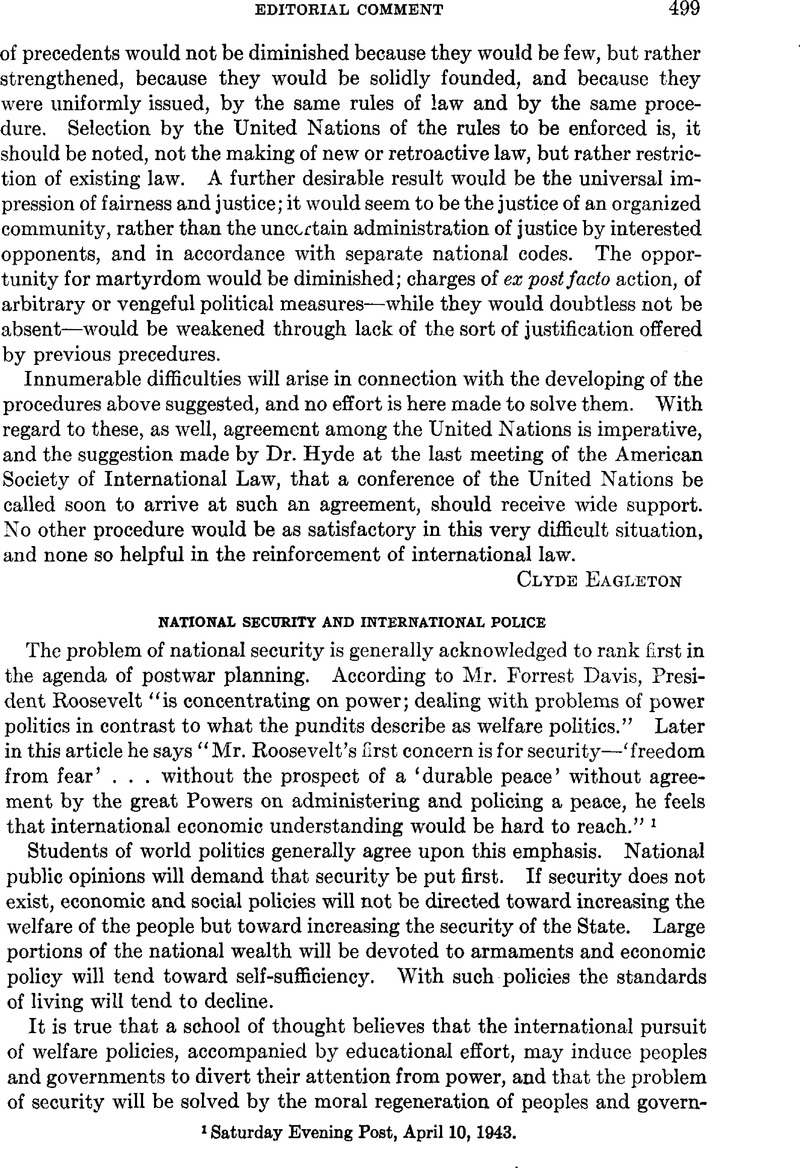Article contents
National Security and International Police
Published online by Cambridge University Press: 12 April 2017
Abstract

- Type
- Editorial Comment
- Information
- Copyright
- Copyright © by the American Society of International Law 1943
References
1 Saturday Evening Post, April 10, 1943.
2 Edward P. Warner, Future Control over German Aviation, Foreign Affairs, April, 1943, p. 427 ff. In his article on “ An International Police Force’’ (this Journal, April, 1943, Vol 37, p. 305) Admiral W. L. Rodgers assumes that such a force would be maintained by the United Nations against the Axis Powers.
3 See above, note 1, and addresses by Sumner Welles, May 30, 1942, Nov. 2, 1942; Viscount Cranborne, June 2,1942; Ambassador of China, HuShih, June 15,1942; Ambassador John G. Winant, July 17, 1942 (United Nations Review, Supp. No. 1, “War and Peace Aims,” January 1930, 1943, p. 44).
4 Admiral W. L. Rodgers, op. cit.
5 Lord Davies, House of Lords Debates, March 11, 1943, Col. 589 ff.; Address by David Lloyd George, January, 1943; Vice President Henry Wallace, American Magazine, March, 1943, p. 98.
6 Q. Wright, A Study of War (Chicago, 1942), p. 749 ff.
7 Wright, Q., “International Law and the Balance of Power,” This Journal, January 1943, Vol. 37, p. 97 ffGoogle Scholar.
8 Q. Wright, A Study of War, pp. 387 ff., 747.
9 The need of an opinion springing from the interest and conviction of individuals and not merely from the contract of governments is widely recognized. See Q. Wright, ibid., pp. 1347–9; Rodgers, op. cit., p. 307.
10 The organization and procedure in the Council would have to weigh influence with a realistic awareness of the political inequality of States. At the present time nearly two-thirds of the world’s population is within the four principal United Nations. Probably each of these States should have a veto on the use of the International Police Force unless itself accused of aggression.
11 See Wright, Q., “The Concept of Aggression in International Law,” This Journal, July 1935, Vol. 29, p. 373 ff.Google Scholar; “Test of Aggression in the Italo-Ethiopian War,” ibid., Jan. 1936, Vol. 30, p. 45 ff.
- 1
- Cited by


